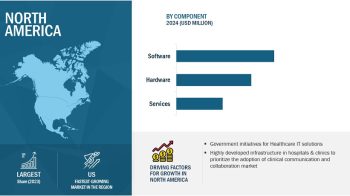On the basis of technology, the U.S. IVD market is broadly segmented into immunoassays/immunochemistry, clinical chemistry, molecular diagnostics, hematology, microbiology, coagulation & hemostasis, and others. Among these, the immunoassays/immunochemistry segment accounted for the largest share of the U.S. IVD market in 2014. The ability of immunoassay/immunochemistry technologies to offer faster results with high sensitivity and accuracy is one of the key factors contributing to the growth of this market over other technologies.
Over the years, the clinical chemistry market has expanded and become highly competitive, showcasing a myriad of opportunities. Growth in this market is driven by various factors such as technological advancements, automation in laboratories, growth in the number of in vitro diagnostic tests in the U.S., and increased awareness about health and diagnostic tests. The rapidly rising aging population and increasing prevalence of chronic diseases are also expected to increase the demand for diagnostic testing, and in turn the demand for clinical chemistry tests. Some of the key players in the clinical chemistry market include Roche Diagnostics (Switzerland), Siemens Healthcare (Germany), Abbott Laboratories, Inc. (U.S.), Danaher Corporation (U.S.), Ortho-Clinical Diagnostics, Inc. (U.S.), Randox Laboratories-US, Ltd. (U.S.), Medica Corporation (U.S.), and bioMérieux SA (France).
The molecular diagnostics (MDx) market is expected to grow at the highest CAGR from 2015 to 2020. Growth in this market is mainly driven by reformations in the reimbursement system; adoption of the Affordable Care Act (ACA); rising prevalence of infectious diseases, cancer, and various genetic disorders; growing demand for blood screening; and increasing application of molecular diagnostic technologies in pharmacogenetics and point-of-care testing. Furthermore, increasing awareness and acceptance of personalized medicines, advancements in technology, hereditary disease testing, and prenatal testing are also expected to contribute to the growth of the molecular diagnostics market in the coming years. However, unfavourable reimbursement for novel diagnostic tests and budget constraints are some of the factors expected to curb the growth of this market to a certain extent.

